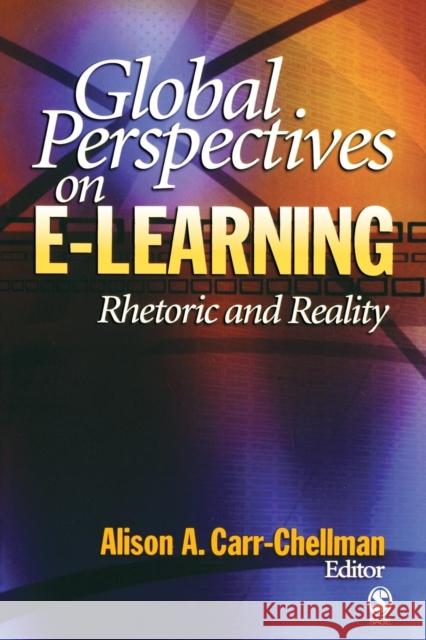Global Perspectives on E-Learning: Rhetoric and Reality » książka
Global Perspectives on E-Learning: Rhetoric and Reality
ISBN-13: 9781412904896 / Angielski / Miękka / 2004 / 288 str.
Global Perspectives on E-Learning: Rhetoric and Reality
ISBN-13: 9781412904896 / Angielski / Miękka / 2004 / 288 str.
(netto: 530,67 VAT: 5%)
Najniższa cena z 30 dni: 518,85
ok. 22 dni roboczych.
Darmowa dostawa!
"The committee felt that Global Perspectives on E-Learning: Rhetoric and Reality was a remarkable commentary on the disconnect between the rhetoric of online learning (anywhere-anytime, open access, democratization, increasing economic opportunity) and the realities in regions as disparate as North America and sub-Saharan Africa (education as a "consumer good," increasing economic and social distances within populations, education for global consumerism rather than civic participation)."--DISTANCE LEARNING COMMUNITY OF PRACTICE???Global Perspectives on E-Learning offers an authoritative compendium of online teaching and learning in a cross-section of nations around the world. This is a state-of-the-art review of promising online programs by authors who have participated in the movement. Rarely do we find such current and authoritative information about educational technology developments in more than a dozen countries in six continents.??????Don Ely, Syracuse University ???We need more critical and reflective texts on distance education and its evolution within a global framework. The authors provide the reader a social and political context for thinking about global education.??????Roberto Muffoletto, Appalachian State University ???Global Perspectives on E-Learning is a fascinating expedition on the road to democratizing online/distance learning through the dichotomy of rhetoric and social realities in countries around the world.??????Paul Gathercoal, California Lutheran University ???I think this is an excellent text. It provides the reader with a broad international perspective of distance education, something that is in short supply.??????Chris Zirkle, College of Education, Ohio State University E-learning is growing around the world, with applications from schools to non-profits to business and industry and, of course, higher education. It has been heralded as the next democratizing force in education for offering access regardless of physical limitations, job status, geography, etc. It has also been challenged as representative of the myth of meritocracy for exacerbating the view that education alone rectifies failures to meet social needs. Further, the financial incentive to privatize education leads many to question its democratic merits. Global Perspectives on E-Learning: Rhetoric and Reality presents several cases of international online education and the rhetoric that surrounds this form of teaching and learning. Editor Alison A. Carr-Chellman examines the impact of online distance education throughout the world in an effort to understand more deeply the merits of such initiatives. Written from a critical perspective, the book sheds light on some of the problems faced by international distance educators. It particularly focuses on who benefits, and who does not, by the advance of international e-learning and how we can respond to the needs of the disenfranchised. This book is intended to supplement what has to this point been largely a positive, how-to literature in distance education. It offers a balanced perspective on the problems and possibilities of distance education worldwide. Global Perspectives on E-Learning is perfectly suited as a supplemental text for a variety of graduate-level education courses. Professional educators, policy makers, and anyone interested in international online education should consider this a vital addition to theirlibraries. Key Features International case studies and discussions that show how initiatives interface with the international e-learning movement Focus questions at the start of each chapter help readers construct an advanced schema Numerous unique viewpoints from around the world provide a sophisticated and comprehensive overview Coverage from a number of countries: China, Taiwan, India, Namibia, Turkey, Ireland, the U.K., New Zealand, Australia, and the United States A matrix of case studies that groups the cases by focus and theme, allowing students and instructors to customize their use of the book











